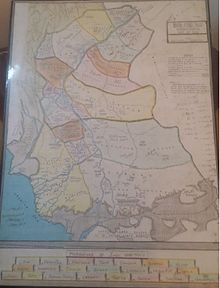Insurgency in Sindh
| Insurgency in Sindh | |||||||
|---|---|---|---|---|---|---|---|
 Map of major ethnic groups in Pakistan, Sindhis (Yellow) are in the Southeast | |||||||
| |||||||
| Belligerents | |||||||
|
Supported by | |||||||
| Commanders and leaders | |||||||
|
(Chief Minister of Sindh) (Interior Minister of Pakistan) (Major-General of Sindh) (Inspector-General) |
| ||||||
| Strength | |||||||
| 50,000+ | Unknown | ||||||
| Casualties and losses | |||||||
| Unknown | Unknown | ||||||
| 83+ civilians | |||||||
The Insurgency in Sindh is a low-intensity insurgency waged by Sindhi Nationalists against the government of Pakistan. Sindhi nationalists want to create an independent state called Sindhudesh.
Sindhi nationalists have allied up with Baloch nationalists over the years to counter Pakistan's security forces. Although, due to Sindh province’s growing middle class and educated youth the insurgency never gained popular support among the masses.[7]
Background
[edit]
In 1972, G. M. Syed proposed the formation of an independent nation for the Sindhis under the name Sindhudesh. He was the first nationalist politician in Pakistan to call for the independence of Sindh in a Pakistan divided by the liberation of Bangladesh.[8] The movement for Sindhi language and identity led by Syed drew inspiration from the Bengali language movement.[9] In post independence Pakistan, the machinations of the Pakistani state convinced Syed that Sindhis would be marginalised in the set up.[8] The concept of Sindhudesh as propounded by Syed calls for the liberation and freedom of Sindhis from an alleged Punjabi-Mohajir imperialism.[8]
With his political base largely weakened after election, Syed later advanced his position towards openly demanding separation from Pakistan and the build-up of an independent Sindhudesh in his books.[10]
The concept of Sindhudesh is also supported by some Sindhi diaspora[citation needed] including Sindhis in India,[11] most of whom had to be relocated out of Sindh after Partition, leaving behind their property as evacuee trusts under reciprocal government supervision. Pre-partition, Sindh was a relative peaceful province, with communal violence only erupting sporadically and during partition.[citation needed] This peace stopped after partition, with post-partition migrants to Sindh angry at the "non-co-operation" in the killing of Hindus; and communal hatred multiplied post partition.[12][13]
However, neither the separatist party nor the nationalist party have ever been able to take centre stage in Sindh. Local Sindhis strongly support Pakistan People Party (PPP). The unparalleled and unhindered success of the PPP in Sindh shows the preference of Sindhis for a constitutional political process over a separatist agenda to resolve their grievances. Similarly public opinion is also not heavily in favour of these parties either. In other words, neither the Sindhi separatists nor the nationalists have significant popular support — certainly not the kind that will make them capable of fuelling a full-scale insurgency.[4]
Issues
[edit]After the death of the former Prime Minister of Pakistan, Benazir Bhutto, the Sindhudesh movement was believed to have seen an increase in popularity. Sindhi nationalists judge that Sindh has been used to the advantage of people from non-Sindhi ethnic groups, citing the dominance of Muhajir people in key areas of Sindh including Karachi, large scale migration to Sindh from other regions of Pakistan, including Khyber Pakhtunkhwa, alleged Punjabi dominance in the defense sector, and an increase in Taliban migrants moving to Sindh; as well as terrorist related attacks on the region.[14] and believe this to be the cause of recent troubles in Sindh (see Sindhi nationalism).
Timeline
[edit]17 August 2003 – In two separate acts of sabotage, portions of railway tracks were destroyed when bombs exploded on up and down tracks in Kotri and Nawabshah.[15]
16 August 2004 – Two bombs explode near Nawabshah, 250 km (150 miles) north-east of Karachi. The first explosion damaged a rail track, while the second explosion a few minutes later wounded two policemen and a journalist who were at the scene.[16]
13 June 2005 – Two electricity pylons of 500kv high transmission line were damaged near the Sann railway station.[17]
14 July 2010 – Sindhi separatists try to blow up Hyderabad railway track, Bomb Disposal Squad defused four bombs found by residents on the track of the Odero Lal Railway Station in Hyderabad.[18]
15 July 2010 – 3 feet of railway tracks destroyed in blast.[19]
1 November 2010 – Two bomb blast at Railway Track between Kotri & Hyderabad.[20]
2 November 2010 – 4 bombs go off, destroying railway tracks in Hyderabad.[21]
4 November 2010 – A low-intensity bomb exploded at railway tracks near Nawabshah, just minutes after a cargo train carrying oil had passed. Another bomb was defused by the bomb disposal squad.[22]
6 November 2010 – Two (JSMM) activists were arrested after being suspected masterminds of the bomb incidents in the beginning of November.[23]
11 February 2011 – Ten low-intensity explosions at railway tracks across Sindh.[24]
12 February 2011 – Blast at rail track near Kotri station [25]
15 February 2011 – Twin blasts damage railway tracks near Matiari.[26]
17 February 2011 – Twin blasts damage railway tracks in Karachi.[27]
29 April 2011 – Blast forces train off the tracks in Sukkur.[28]
27 November 2011 – Six bomb blasts damage railway tracks in Sindh.[29]
26 May 2012 – On the National Highway a group of unknown gunmen attacked and killed 7 people and at least 25 more were injured in a passenger bus. SLA claimed the attack.[30]
12 July 2013 – Two powerful blasts rocked Hyderabad, one at the boundary wall of the office of Senior Superintendent of Police (SSP) Hyderabad and the other at a railway track in Hussainabad. Both the explosions were heard far and wide.[31]
5 November 2013 – A bomb planted near a railway track near Hussainabad in Hyderabad destroyed a portion of up-track.[32] A second bomb went off in Khairpur District after the departure of the Shalimar Express to Karachi via the Gambat railway station.[33]
14 November 2016 – A vehicle of a Chinese engineer was targeted with remote control bomb at Gulshan-e-Hadeed, Karachi. The Chinese national and his driver were seriously injured.[34]
5 August 2020 – The Sindhudesh Revolutionary Army claimed responsibility for a grenade attack on a rally organized by the Jamaat-i-Islami in Karachi that injured about 40 people. The rally was taken out on the first anniversary of India government’s decision to revoke the special status of Jammu and Kashmir. Despite the blast, the rally continued.[35]
14 March 2022 – The Counter Terrorism Department arrested three members of the SRA in Sukkur.[36]
1 April 2022 – Two blasts damage railway tracks in Kotri, the SRA claims responsibility.[37]
7 April 2022 – Three alleged militants of the SRA were arrested by Hussainabad police.[38]
29 April 2022 – A blast damages an electricity pylon near Tando Mohammad Khan road, SRA claims responsibility.[39]
12 May 2022 – The Sindhudesh Revolutionary Army claimed responsibility for an attack in the Saddar area of Karachi killing one civilian and injuring seven others.[40][41]
17 May 2022 – Larkana police claimed to have arrested six militants of the Asghar Shah group of the SRA in Nasirabad.[42]
See also
[edit]References
[edit]- ^ a b c "Pakistani militants shift focus to cities in targeting of Chinese". Nikkei Asia. 27 December 2020.
- ^ "'Sindhi separatists carried out 10 terror attacks across province in 2020'". The News. 4 January 2021.
- ^ "Missing political approaches". Dawn News. 12 July 2020.
- ^ a b Aakash Tolani (16 April 2014). "Sindh is not East Pakistan". Observer Research Foundation (ORF).
- ^ "BNA chief says farewell to arms". Express Tribune. 23 May 2023. Retrieved 23 May 2023.
- ^ "Sarfraz Bangulzai Baloch Appointed As New Head of BNA, Media Reports". Khaama Press. 19 April 2023. Retrieved 19 May 2023.
- ^ "Sindhi and Baluch Separatists Team Up to Target Chinese Interests in Pakistan". Jamestown. Retrieved 2023-02-21.
- ^ a b c Farhan Hanif Hanif Siddiqi (4 May 2012). The Politics of Ethnicity in Pakistan: The Baloch, Sindhi and Mohajir Ethnic Movements. Routledge. pp. 88–. ISBN 978-1-136-33696-6. Retrieved 16 July 2012.
- ^ Goulbourne, Harry (2001). Race and Ethnicity: Solidarities and communities. Taylor & Francis. p. 251. ISBN 978-0-415-22501-4.
- ^ Jalal, Ayesha (1995). "Conjuring Pakistan: History as Official Imagining". International Journal of Middle East Studies. 27 (1). Cambridge University Press: 73–89. doi:10.1017/S0020743800061596. ISSN 1471-6380. JSTOR 176188. S2CID 162731882.
- ^ Suranjan Das (2001). Kashmir and Sindh: Nation-building, Ethnicity and Regional Politics in South Asia. Anthem Press. p. 144. ISBN 978-1-898855-87-3.
- ^ M.G. Chitkara Mohajir's Pakistan ISBN 81-7024-746-2
- ^ F. Ahmed. Pakistan's Problems p.130
- ^ Guerin, Orla (2010-06-22). "BBC News — Karachi faces growing Taliban menace". Bbc.co.uk. Retrieved 2012-06-05.
- ^ "Two bomb blasts damage rail track". Daily Dawn. 17 August 2003. Retrieved August 17, 2003.
- ^ "Late Pakistan train escapes bomb". BBC News. 25 August 2004. Retrieved August 25, 2004.
- ^ "Bomb blasts near Sann station damage pylons". Daily Dawn. 13 June 2005. Retrieved June 13, 2005.
- ^ "Sindhi separatists try to blow up Hyderabad railway track". The Express Tribune. 13 July 2010. Retrieved July 14, 2010.
- ^ "3 feet of railway tracks destroyed in blast". The Express Tribune. 14 July 2010. Retrieved July 15, 2010.
- ^ "4 injured in two blasts around railway track in Hyderabad". The Nation (Pakistan). 1 November 2010. Retrieved 2019-11-28.
- ^ "4 bombs go off, destroying railway tracks in Hyderabad". The Express Tribune. November 2010. Retrieved November 2, 2010.
- ^ "Blast damages rail tracks for third day running". The Express Tribune. 3 November 2010. Retrieved November 4, 2010.
- ^ "2 alleged masterminds arrested". The Express Tribune. 6 November 2016. Retrieved 17 June 2018.
- ^ "10 low-intensity explosions at railway tracks across Sindh". The Express Tribune. 12 February 2011. Retrieved February 12, 2011.
- ^ "Blast at rail track near Kotri station". Geo News. Archived from the original on February 15, 2011. Retrieved February 12, 2011.
- ^ "Blasts damage railway track in Matiari". Daily Dawn. 15 February 2011. Retrieved February 15, 2011.
- ^ "Twin blasts damage railway tracks in Karachi". The Express Tribune. 17 February 2011. Retrieved February 17, 2011.
- ^ "Railway bomb: Blast forces train off the tracks". The Express Tribune. 28 April 2011. Retrieved April 29, 2011.
- ^ "Pakistan railway track resumes traffic after blasts in sindh". The News Tribe. Retrieved November 27, 2011.
- ^ "7 killed in bus attack Sindhu Desh Liberation Army claims responsibility". pakobserver.net. Archived from the original on 16 June 2013. Retrieved 22 May 2022.
- ^ Khan, Mohammad Hussain (12 July 2013). "Two blasts hit Hyderabad". Dawn (newspaper). Retrieved 2019-11-28.
- ^ "Pak Business Express narrowly escapes railway track bomb blast in Hyderabad". The Express Tribune. 5 November 2013. Retrieved 2013-11-05.
- ^ "Pakistan railway track resumes traffic after blasts in sindh". Central Asia Online. Retrieved November 5, 2013.
- ^ "Warnings were out about SDLA plan to attack Chinese nationals". Central Asia Online. Retrieved November 14, 2016.
- ^ Ali, Qazi Hassan | Imtiaz (2020-08-05). "Nearly 40 injured in grenade attack on JI rally in Karachi". DAWN.COM. Retrieved 2020-08-06.
- ^ "Three terrorists arrested in CTD operation in Sukkur".
- ^ "Blasts damage railway tracks, terrorist outfit says a message for 'outsiders' to leave Sindh".
- ^ "Three alleged terrorists of Sindhu Desh Revolutionary Army held". 6 April 2022.
- ^ "Blast damages electricity pylon near Tando Mohammad Khan". 29 April 2022.
- ^ "One killed, seven hurt in Karachi blast".
- ^ "Karachi blast". 18 May 2022.
- ^ "Police claim arrest of six 'SRA militants' in Larkana". 17 May 2022.

